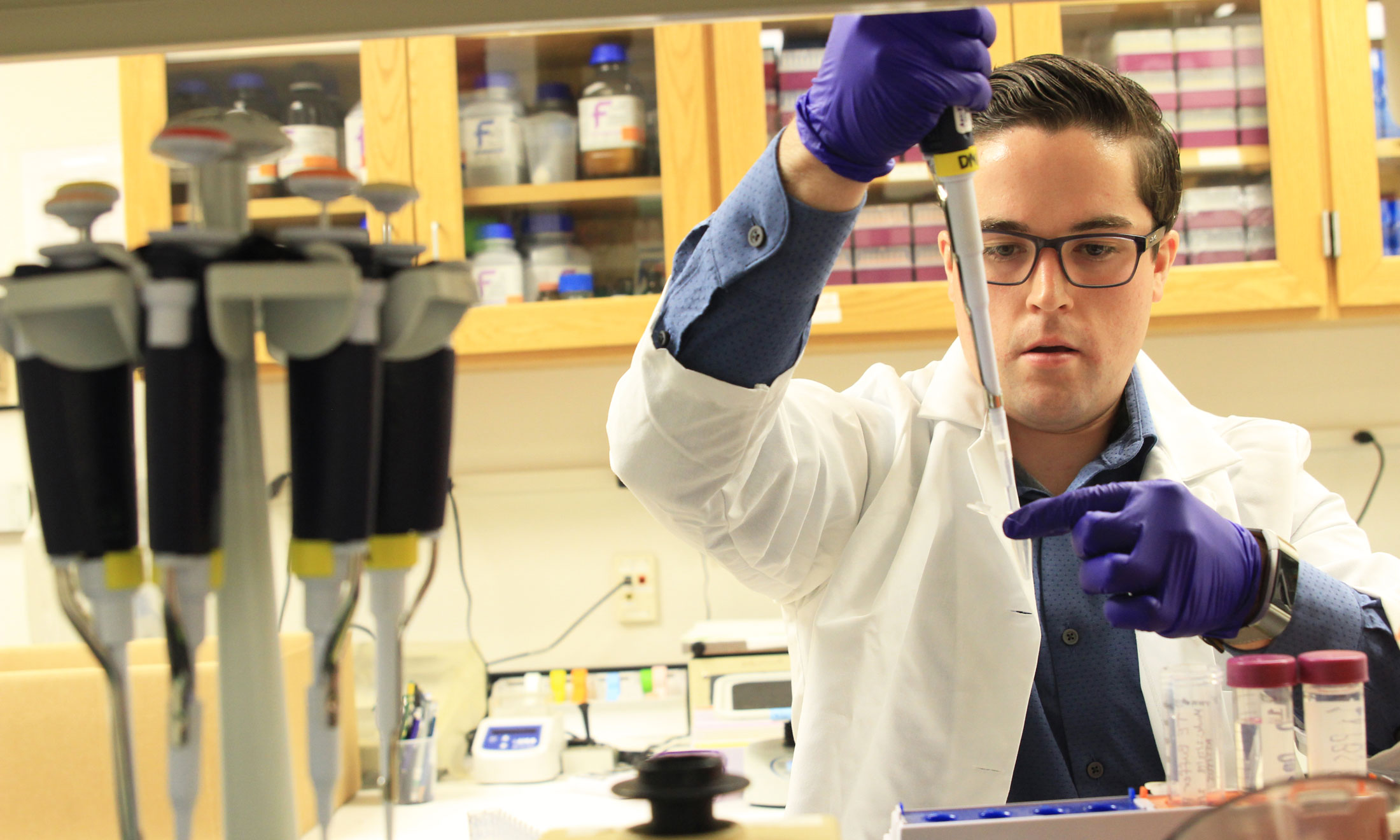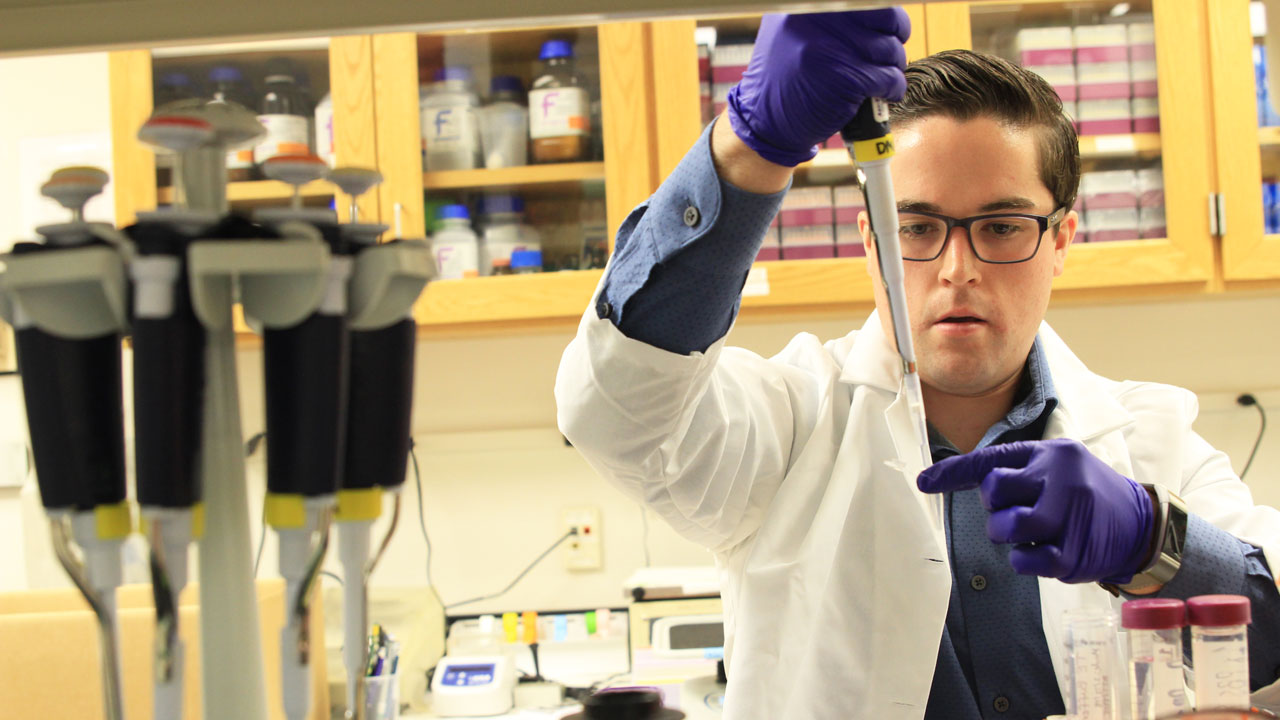Students investigate genetic link to heart disease
Senior biology major Alex Johnston is part of a student research team whose goal is to prevent heart attack and stroke. He is also captain of the College of Arts and Sciences Heart Walk team, one of several OU teams that raise money in support of the American Heart Association. This year's Heart Walk is Saturday, May 18 in Detroit.

Alex Johnston is pictured conducting heart research in Dr. Randal J. Westrick's lab. Outside the lab, he takes part in the American Heart Association's annual Heart Walk, to help raise money to combat heart disease and stroke.

Alex Johnston was a freshman when he started as a clinical volunteer in the emergency department at a Detroit area hospital. After seeing several patients lose their life to heart attack and sudden cardiac arrest, the now senior biology major says he grew curious about the events that lead to heart attacks and how to prevent them.
These experiences early in his undergraduate career led to his involvement in heart research. According to the Centers for Disease Control, heart disease is the leading cause of death in the United States.
While working in the laboratory of Assistant Professor of Biological Sciences, Dr. Randal J. Westrick, Johnston obtained his own summer undergraduate research fellowship from the American Heart Association. The funding supported research on the genetic regulation of Plasminogen Activator Inhibitor-1 (PAI-1) in mouse platelets. PAI-1 is a protein that prevents the breakdown of blood clots, which can increase an individual’s risk for heart attack and stroke.
“A blood vessel blockage, typically formed by plaque, could eventually break away inside a blood vessel and form a clot, which interrupts blood flow,” Johnston explained. “This, in turn, can lead to a heart attack or stroke.”
He added that build-up of these clots in the lower legs is called deep vein thrombosis, or DVT, and “these clots are typically very problematic for patients as they can break loose and cause a serious lung problem, known as pulmonary embolism.”
PAI-1 plays a major role in the development of these clots, he said, but the role of PAI-1 within platelets – which are tiny cells that circulate in the blood and upon activation help the body form blood clots – has not been well studied.
Johnston and other Westrick lab members worked to identify a genetic locus (the location of a gene or genetic marker) responsible for platelet PAI-1 expression differences they observed between two different mouse strains. Johnston and the Westrick lab were rewarded by their efforts when they genetically mapped the regulatory region controlling platelet PAI-1 expression with such high precision that the area comprises just 0.15 percent of an entire chromosome.
“We have not found the specific regulatory locus yet, but we have located the region in which it resides, which is on chromosome 5 in mice,” Johnston said.
Johnston presented these findings at the International Mammalian Genome Conference in Heidelberg, Germany in 2017, and in Rio Mar, Puerto Rico in 2018. He and other lab members are working on a manuscript to publish their findings.
More research is in the works. Dr. Westrick is the program director of an institutional grant from the American Heart Association that will allow OU undergraduate students to conduct cutting-edge basic heart research for the next three years.
Students accepted into the program will get matched with a laboratory led by a faculty member engaged in heart-related research at OU. The program includes labs in the Department of Biological Sciences, Department of Chemistry and Department of Physics.
Register for the Heart Walk!
This year’s Heart Walk is Saturday, May 18, at Wayne State University in Detroit.
“The Heart Walk is a great community event, and some of the money raised will go to support research like Alex’s,” said Glenn McIntosh, vice president for student affairs and chief diversity officer at OU.
Currently, OU has 14 Heart Walk teams, from the College of Arts and Sciences, Office of the President, School of Health Sciences, School of Nursing, and the Oakland University William Beaumont School of Medicine, to name a few.
For more information, or to join an OU Heart Walk team, visit OU’s Heart Walk page.
Outside of his research endeavors, Johnston participates in the American Heart Association’s annual Heart Walk, which raises money to combat heart disease and stroke. He is the captain of the OU College of Arts and Sciences Heart Walk team, the “OU Clot Busters.”
Last year, the team included 21 members and was the largest contingent from Oakland University. Through dedication and extensive recruitment, the team raised more than $2,000 to help support the association’s mission to fight heart disease.
Johnston looks forward to continuing his passion for research and developing innovative ways to combat human diseases when he begins medical school in August 2019.


 April 10, 2019
April 10, 2019